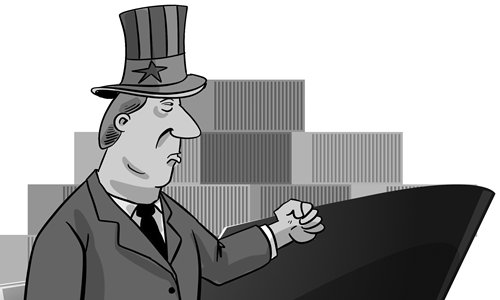HOME >> BUSINESS
Conclusion of China-US trade war hopeful
Source:Global Times Published: 2019/11/5 19:48:40

Frank-Jürgen Richter Photo: Courtesy of Frank-Jürgen Richter

Illustration: Luo Xuan/GT
Editor's Note:
Mixed signals have been given off throughout the course of the China-US trade war, adding pressure to the global economy which has shown signs of recession. Against this background, the 2019 Horasis China Meeting in Las Vegas was convened at the end of October to discuss the economic outlook for China and the US. Hou Jianyu (GT), a Global Times correspondent in the US, spoke with Frank-Jürgen Richter (Richter), founder and chairman of Horasis, on Friday in New York, getting his insight into the ongoing China-US trade war and hearing his suggestions for both sides.
GT: During the China-US trade war, the Chinese have seemed more likely to cooperate than the US, but some US governors feel pressure from the domestic political power that supports nationalism and protectionism, and sees China as a competitor and enemy. How do you deal with this situation?
Richter: I agree both parties should speak to each other fairly and respectfully. US pressure on China does little to improve the current situation. On the level of state governments and large companies, there is no anti-China sentiment at all. Rather, the resistance against greater relations with China comes from the federal government. Yet, by contrast, the American entrepreneurs view China as the rising engine of globalization.
There was virtually a declaration by all attendees of the Las Vegas meeting that the trade war should come to an end. International economic conflicts are a zero-sum game. However, trade wars by their very nature do not benefit anyone. All participants lose, even stakeholders who are not directly involved stand to lose as well.
Europe has lost a great deal as the Chinese demand for European products is shrinking. Europeans have become quite dependent on the Chinese economy, but the supply chains they rely on have been scattered and disrupted. As a result, Europe is falling into a crisis and the trade war is to blame.
My hope is for the trade war to end in a reasonable agreement that benefits all parties. China is ready to come to an agreement and the US should adapt to the conditions of international trade.
A meeting between leaders of China and the US was recently canceled, but I believe that a meeting will take place in November or December. There is the likelihood that an agreement will be signed concerning the first phase of the trade war, agriculture, which is easy to resolve.
Reaching a resolution on the second phase of the trade war is far trickier. With concern for protecting intellectual property, the US has strict law enforcement.
The solution, however, requires not one but all nations to enforce intellectual property rights laws. I remain hopeful that the second phase of the trade war can be concluded and that the tariffs will be lifted from all sides. That is the positive view.
As a Swiss organization, we do not take sides. We are always neutral. Regardless, we are of course friends with China. We understand China's rise and, in addition, we understand China's challengers. We expect a country such as the US to treat China in a fair way.
GT: Can you predict the future of the China-US relationship?
Richter: Considering the future of the American and Chinese relationship, we acknowledge that the China-US relationship is the most important one in the world. There is no other relationship in world civilization that can be compared to the importance of this one. I hope that a strategic dialogue takes place between the two countries, instead of the recent tit-for-tat that we have been experiencing. US Vice President Mike Pence made an aggressive speech demanding many changes from China.
I disagree with Vice President Pence because I support the Chinese philosophy of avoiding the internal affairs of foreign nations. Foreign nations should not order any country to change their own rules. From the US side, the upcoming 2020 elections will see a plethora of China-bashing as part of the campaigns. US President Donald Trump will criticize China in the hope of retaining power. Yet, if the Democrats win the election, the pressure on China may continue, even if they choose to decrease it by some degree. The China question in the US will not disappear.
GT: Do you have any suggestions for US and Chinese people? Do you have any suggestions for the US and China governments?
Richter: From the conference in Las Vegas, it was evident that the Chinese know far more about the US than the Americans know about China. My recommendation is that US schools should teach more about China to their students, and that the US should encourage more of its students to study in China.
On the governmental level, more strategic dialogues between the two nations could help. During the Obama administration, there was a positive dialogue between the two nations, and both will benefit if the strategic discussions are restored.
My suggestion to China is that they might find a new ally and partner with the EU, and that China should work more on public relations. The world's public should know more about the good things coming out of China. If China improves in these areas, there will be increased opportunities for the Chinese people and the rest of the world.
This interview was conducted by Hou Jianyu and transcribed by Hou and Thomas Henderson.
Posted in: INSIDER'S EYE